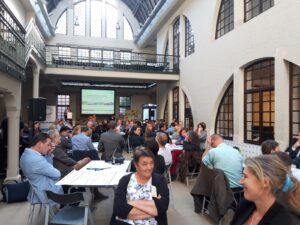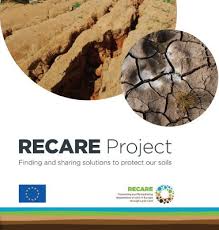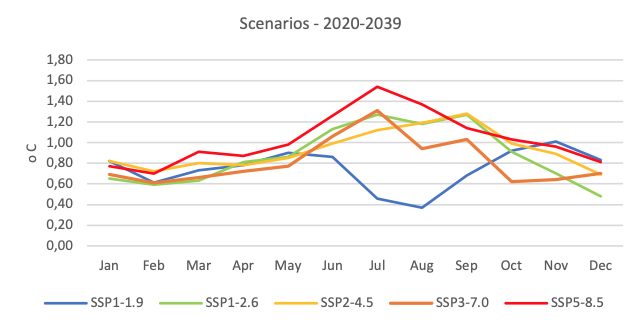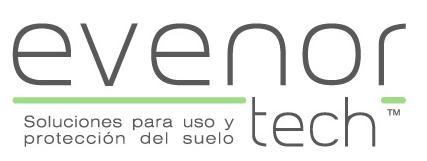Evenor-Tech’s experience and expertise have been forged through several flagship projects dating back to 2009. These projects have covered a wide range of areas, from research in agricultural and environmental sciences to the implementation of advanced technological solutions. Through initiatives such as ‘RECUPERA 2020’, which focuses on the remediation of contaminated soils, or ‘AgrarIA’, which aims to drive agricultural innovation through cutting-edge technologies such as Artificial Intelligence, Evenor-Tech has demonstrated its commitment to sustainability, efficiency and the transformation of various sectors. These projects demonstrate Evenor-Tech’s ability to tackle complex challenges and develop creative and viable solutions that have a positive impact on society and the environment.
| Project title | RECARE. PREVENTING AND REMEDIATING DEGRADATION OF SOILS IN EUROPE THROUGH LAND CARE |
| Country | Netherlands, Greece, Spain, Cyprus, Norway, Portugal, Iceland, Switzerland, Austria, Belgium, Germany, United Kingdom, Slovakia, Romania, Poland, Denmark |
| Name of client | European Commission |
| Origin of funding | Environmental 7 Framework Programme (2012) |
| Dates (star-end) | November 2014 – January 2017 |
| Detailed description of project | The RECARE project, funded by the EU’s Seventh Framework Programme, aims to develop and validate innovative measures for soil prevention, remediation and restoration in different European environments. Through 17 case studies, it addresses soil threats, evaluates remediation measures, reviews EU policies and disseminates results to promote sustainable soil management. The Evenor-Tech team and the Institute of Natural Resources and Agrobiology are focusing on ‘Soil Pollution’ through the Guadiamar Green Corridor case study, which uses large-scale phytoremediation to remediate contamination resulting from a mining accident in 1998. The challenge of the project is to generalise the results to a European level, draw conclusions and make predictions about the effects of soil degradation. |


| Project title | OPERA. 0PERATIONALIZING THE INCREASE OF WATER USE EFFICIENCY AND RESILIENCE IN IRRIGATION |
| Country | Netherland, South Africa, Spain, France, Italy, Poland |
| Name of client | JPI Water Works 2015 |
| Origin of funding | Public funds |
| Dates (star-end) | 01/05/2017 – 31/12/2019 |
| Detailed description of project | Agriculture faces shifting weather patterns, posing risks to crop growth and work conditions. Reliable soil moisture data is crucial for farmers to decide when and how to irrigate. The OPERA project addresses water scarcity by developing user-friendly decision support models for irrigation. Integrating remote sensing, soil moisture monitoring, and forecasting, OPERA adopts a transdisciplinary approach to meet user needs, identify suitable technologies, and create practical precision irrigation solutions. The goal is to swiftly transition towards widespread precision irrigation implementation, considering demands from farmers, extension services, and water management organizations. |
| Web | Link |
| Project title | CONSOLE. CONTRACT SOLUTIONS FOR EFFECTIVE AND LASTING DELIVERY OF AGRI-ENVIRONMENTAL- CLIMATE PUBLIC GOODS BY EU AGRICULTURE AND FORESTRY |
| Country | Austria, Belgium, Bulgaria, Germany, Spain, Finland, France, Ireland, Italy, Latvia, Netherlands, Poland, United Kingdom |
| Name of client | European Commission |
| Origin of funding | Horizon 2020 research and innovation programme (GA 817949) |
| Dates (star-end) | 01/05/2019 – 30/04/2022 |
| Detailed description of project | The CONSOLE project aims to promote innovation in the delivery of agri-environmental and climate public goods (AECPGs) in European agriculture and forestry. It aims to create a community of practice (CoP), design effective cooperation models and develop a contractual framework to support the implementation of AECPGs. Specific objectives include creating an operational contractual framework, learning from successful EU and third country contract solutions, assessing stakeholder acceptance of innovative contracts, exploring the economic, social and environmental performance of new contract designs, establishing a CoP for AECPG practitioners, and ensuring that results are accessible to different stakeholders. CONSOLE aims to transform the way AECPGs are implemented in Europe. |
| Web | Link |
| Project title | STEAMBIOAFRICA. Innovative Large-Scale Production of Affordable Clean Burning Solid Biofuel and Water in Southern Africa |
| Country | European Commission |
| Name of client | Botswana, Namibia, South Africa |
| Origin of funding | Horizon 2020 research and innovation programme (101036401 |
| Dates (star-end) | 01/09/2021 – 01/08/2024 |
| Detailed description of project | The primary goal of STEAMBIOAFRICA is to validate the viability and sustainability of superheated steam biomass processing as a source of large-scale, clean, safe, and affordable energy in southern Africa. The project aims to gain market acceptance and ensure that the benefits outweigh the costs of collection and processing. By exploring various market opportunities, the project will develop an exploitation plan to promote bush harvesting and combat encroachment, leading to long-term socio-economic and environmental benefits in the region. STEAMBIOAFRICA aims to address challenges related to low-carbon energy, climate change, and resource efficiency in South Africa, transforming them into sources of clean energy, water, and sustainable rural economies. |
| Web | Link |
| Project title | NOVASOIL. RESEARCH AND INNOVATION AND OTHER ACTIONS TO SUPPOT THE IMPLEMENTATION OF A MISSION IN THE ARE OF SOIL HEALTH AND FOOD |
| Country | Italy, Germany, Latvia, Bulgaria, United Kingdom, France, Denmark, the Netherlands, Estonia, Spain |
| Name of client | European Commission |
| Origin of funding | HORIZON.MISS.2021.SOIL.02-05 |
| Dates (star-end) | 01/05/2019 – 30/04/2022 |
| Detailed description of project | The overall objective of the NOVASOIL project is to demonstrate the social and environmental benefits of investing in soil health. The main expected outcome of the project is a toolbox for analysing the suitability of different business cases for promoting soil health. This toolbox will be based on a number of good examples from Europe and other countries and on the needs and demands of society. The toolbox will include a categorisation of models and business cases taking into account: a) sustainable soil management under different land uses and climatic conditions; b) products based on practices that promote soil health; c) consumption and certification practices that promote soil health; d) land reuse; and e) sustainable soil management in the context of the EU Taxonomy Regulation. To make the results of CONSOLE operational and easily accessible to a wide target audience of interested actors and stakeholders (farmers, farm advisors, administrations, companies along the value chains, NGOs, etc.), thus contributing to a significant change in the way the AECPGs are implemented in Europe. |
| Web | Link |
| Project title | MRV4SOC. MONITORING, REPORTING AND VERIFICATION OF SOIL ORGANIC CARBON AND GREENHOUSE GAS BALANCE |
| Country | Spain, Belgium, Greece, Israel, Czech Republic, Netherlands, Italy, Germany, France, Norway |
| Name of client | European Commission |
| Origin of funding | HORIZON.MISS.2021.SOIL.02-05 |
| Dates (star-end) | 01/05/2019 – 30/04/2022 |
| Detailed description of project | MRV4SOC is a project that focuses on developing a comprehensive methodology for estimating greenhouse gas (GHG) and carbon (C) budgets, taking into account multiple carbon pools and linking carbon and nitrogen cycles to quantify soil organic carbon accumulation. It aims to address the challenges of climate change, socio-economic impacts and building confidence in voluntary carbon markets. The project’s 3-year plan includes assessing carbon pools in different land use classes in demonstration sites, working on a scalable and standardised Tier 3 methodology, and integrating the approach into national greenhouse gas reporting. Collaboration with local stakeholders will validate the methodology across different ecosystems and climates, contributing to reliable carbon credits and cost-effective monitoring, reporting and verification. |
| Web | Link |
| Project title | Assessment of soil carbon in an asparagus field in Pertuis, France, under future climate change scenarios |
| Country | France |
| Name of client | AGQ Labs and Technological Services, S.L. |
| Origin of funding | Private fund |
| Dates (star-end) | 23/01/2023 – 14/02/2023 |
| Detailed description of project | Soil data from asparagus crops in Pertuis, France, were collected and processed. The CarboSOIL model was then used to calculate soil carbon content in Asparagus sp. plants. Models for plant carbon content were developed, and predictive models were created to evaluate the effects of future climate change scenarios on both soil carbon and asparagus plants. The project encompassed data import, curation, CarboSOIL model application, plant carbon content modeling, and predictive modeling for climate change impacts. |
| Web | Link |

| Project title | Elaboración del Plan Estratégico del Centro de Extensión y Transferencia Tecnológica (CET) del CITE Forestal Maynas |
| Country | EUROPE (Belgium, France, Italy, Germany, Greece, Spain, Czech Republic, United Kingdom, Switzerland) |
| Name of client | PROINNOVATE, Ministerio de la Producción, CITE Forestal Maynas (Perú) |
| Origin of funding | Banco Interamericano de Desarrollo (BID) |
| Dates (star-end) | Agosto 2023 – diciembre 2023 |
| Detailed description of project | Elaboración de un plan estratégico para un Centro de Extensión y Transferencia Tecnológica (CET) en el sector forestal y de transformación de madera, específicamente para el CITEforestal Maynas. El objetivo principal es cerrar brechas técnico-productivas en el sector forestal de la región Loreto mediante servicios de asesoría y apoyo tecnológico. La consultoría involucra realizar un diagnóstico en profundidad del mercado objetivo y luego formular un plan estratégico basado en este diagnóstico. |
| Web | Link |
| Project title | DEploying Ecosystemic solutions to imProve soil Health and uncOveRing subsoil functIons in the critical ZONe. DeepHorizon |
| Country | EUROPE (Belgium, France, Italy, Germany, Greece, Spain, Czech Republic, United Kingdom, Switzerland) |
| Name of client | European Commission |
| Origin of funding | HORIZON EUROPE – HORIZON-MISS-2023-SOIL-01-01: Discovering the subsoil. |
| Dates (star-end) | 01 Oct 2024 (48 Months) |
| Detailed description of project | The project addresses the urgent need for sustainable management of Europe’s subsoils, which are often neglected in research and soil management. Specific objectives: Objective 1: Improve access to data and knowledge on European subsoils by creating a publicly accessible geographical database. Objective 2: Provide land managers and authorities with new tools and indicators to understand the dynamics and functions of subsoils. Objective 3: To accelerate the identification and implementation of sustainable land management practices to protect and restore European subsoils. Objective 4: Improve knowledge of the economic and ecosystem costs of sustainable land management practices that improve subsoil functions. Objective 5: Propose financial and policy incentives to improve the implementation of sustainable land management practices. Objective 6: To increase public awareness of the importance of subsoils and to integrate the results into EU databases so that they are available to the whole research and professional community. |
| Web | Link |

